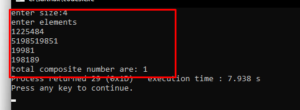In this blog, we will create a program to count all the composite numbers in an array using C++.
What are Composite numbers?
Composite numbers are numbers with more than two factors. Numbers can be classified based on the number of factors they have. If a number has only two factors – 1 and the number itself, then it is a prime number. However, most numbers have more than two factors and are called composite numbers.
Algorithm to count Composite numbers in C++
- Declare one array and three variables.
- First, take two inputs for the size of the array and another to take the elements in the array.
- Take two for loops, one is for input and another for loop is to give logic and condition.
- Take if, else if, and if statements.
- Print the appropriate message.
C++ program to count composite numbers in an array in C++
#include <iostream>
#include <vector>
#include <algorithm>
using namespace std;
// Function to find and return the
// the count of the composite numbers
int compcount(int ar[], int num, int* sum)
{
// storing the largest element of the array
int max_val = *max_element(ar, ar + num);
// Using sieve to find all prime numbers
// less than or equal to max_val
// Create a boolean array "prime[0..n]". A
// value in prime[i] will finally be false
vector<bool> pr(max_val + 1, true);
// setting the values of 0 and 1 as
// true for prime.
pr[0] = true;
pr[1] = true;
for (int p = 2; p * p <= max_val; p++){
// If prime[p] is not changed, then
// it is a prime
if (pr[p] == true){
// Update all multiples of p
for (int i = p * 2; i <= max_val; i += p){
pr[i] = false;
}
}
}
// Count all composite
// numbers in the arr[]
int ans = 0;
for (int i = 0; i < num; i++){
if (!pr[ar[i]]){
ans++;
*sum = *sum + ar[i];
}
}
return ans;
}
// Driver code
int main(){
int ar[] = { 1, 2, 3, 4, 5 };
int num = sizeof(ar) / sizeof(ar[0]);
int sum = 0;
cout << "Count of Composite Numbers = "<< compcount(ar, num, &sum);
cout << "\nSum of Composite Numbers = " << sum;
return 0;
}
Explanation of the code
- Enter an array of positive integers
- Calculate its size
- Initialize the sum variable to store the sum of the composite numbers.
- Store the maximum value present in the field in a variable
- Calculate the prime numbers to the maximum value.
- Iterate through the entire array and check if the number is prime or not. If the number is not prime, it will be a composite number, and if so, increment the composite number by 1 and add its value to the sum.
Output of the code

